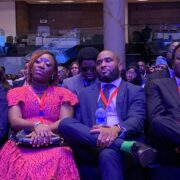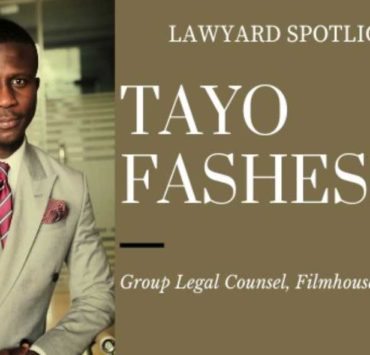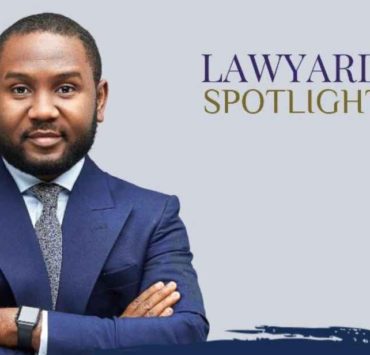Afoma Ofodile (In-House Legal Counsel, General Electric)

Lawyard is a legal media and services platform that provides…
Afoma Ofodile is a commercial lawyer with experience providing strategic legal advice to executive leadership teams across various industries. She has worked on structuring deals and negotiating complex contractual arrangements in the energy and aviation sectors alongside key players including project sponsors, lenders, aircraft lessors, airline operators and government regulators. She is currently an in-house legal counsel at General Electric (GE), an industrial manufacturing multinational company and is based in Dubai, UAE.
Kindly tell us a bit about your personal journey
I was born in Warri, Delta State. My family lived there until I was about 10 and then we moved to Lagos. By the time we moved to Lagos, I was in boarding school in Benin so I would shuttle back and forth every few weeks. After secondary school, I undertook my GCE Advanced Level program in Lagos, subsequently attended the University of Leeds, UK for my undergraduate degree study and returned to Nigeria to attend the Nigeria Law School, Lagos campus. Thereafter, I attended Cornell University for my master’s degree.
Did mentors influence your career decisions?
Definitely. Mentors are important because they show you what is possible. For every positive trait or skill that I have learnt or beneficial experience I have had, I can always point to an individual or a group of people that have either inspired or encouraged me to go for those things.
Interestingly, I wanted to be a lawyer because of lawyers I saw on TV. As I grew up, I had people in my life especially my parents who observed me and encouraged me to develop natural talents that I later realized were useful for the legal profession. My decision to become a commercial lawyer was bolstered by the opportunity to interact with commercial lawyers who were friends of my family. Then during both my undergraduate and graduate study experiences, the opportunity to interact with lawyers at various stages of their careers undoubtedly informed the path I am now on. Mentorship makes you understand that certain things are possible, and really good mentors makes you believe that nothing is impossible.
Please tell us about your professional life
I currently work as an in-house legal counsel in GE Aviation. I have been in this particular role for a year, but I have been in the General Electric Corporation for 5 years working across different businesses and organizations. I provide legal advice and direction to executive leadership on a broad range of matters including commercial transactions and deal structuring, international trade compliance, public procurement, corporate law and governance, regulatory compliance, as well as business and project development.
Before GE Aviation, I was a legal counsel supporting the GE Power business and the broader GE Sub-Sahara Africa organization. Prior to GE, I worked for a commercial law firm in Lagos for about 2 years.
What influenced your decision to become a transaction counsel or as some call it, ‘a commercial lawyer’?
The motivation for me was that I saw it as an opportunity to do what I really wanted in an environment that appealed the most to me. I knew very early on that my area of interest was in commercial law. I felt more engaged by deal making and structuring commercial transactions that created value, and had zero interest in litigation.
I went out of my way to ensure I was aware of the available career options. I got the opportunity to do a bunch of activities during my undergraduate study like mock trials, negotiation competitions, law society organized excursions to lower courts. I was selected to be on the Innocence Project for a year which was an insightful experience into how the criminal justice system worked. Also in graduate school, I participated in a transactional lawyering competition judged by partners at some of the top New York law firms. Whenever we would have meet and greets, the General Counsels I met captured my interest with how they balanced their legal training with a thorough understanding of business and the markets their corporations participated in.
Also, I always wanted to work in a global environment, across countries and cultures. As you know, the practice of law is very jurisdictional so being an in-house counsel was probably the only way I knew to be able to sit in Lagos or Dubai and work on deals in countries across Africa or the Middle East. Being an in-house counsel also feeds my curiosity for how corporations are run, especially how leaders balance competing demands of both internal and external stakeholders.
When I combined these interests and aspirations, working in-house in a multinational corporation was the likeliest way I saw to fulfill them.
How are you able to manage teams in different parts of the world especially with the travel restrictions in place as a result of the Covid-19 pandemic?
At GE, we have an abundance of tools that my team uses to stay connected including Skype, Teams etc. It also helps that all the right structures are in place i.e. electricity and fast internet connection. The only adjustment has been not being able to walk over to someone’s office and have a face to face conversation, which sometimes is the best option when things get lost in communication. But that is the nature of working across regions which makes you learn how important clear communication is. Notwithstanding, it has not been a difficult transition.
What are your thoughts on the possible impact of the Covid-19 pandemic on the aviation industry?
The foreseeable concerns are around how soon airline operators can get people back in the sky safely and then by how much, if at all, their business models will change. With a lot of our customers grounding their fleet and the general uncertainty about when the pandemic will be brought under control, nobody really knows when things are going to go back to normal. If passengers are not flying, then airline operators are not making any revenue, and that has a knock-on effect on everybody in the value chain. The COVID19 aftermath will see a lot of people become more cautious about air travel; airline operators will have a renewed focus on safety and hygiene and will have to be flexible to adapt to ever changing flight restrictions from regulators.
You work across multiple jurisdictions with possibly different regulatory systems, cultures and commercial realities; how do you strike a balance?
Systems, and regulations enacted within and to uphold those systems, are in place both to protect consumers and facilitate business growth. Commercial realities are created and enforced by companies that have similar motivations; to provide goods or services that consumers need and to grow and be comfortable in a particular market. The need to strike a balance arises where you work for a corporation that does business in different countries and their internal processes do not quite match the expectation of a particular country. Sometimes it is the opposite where the systems and regulations of a particular country do not match the expectation of the corporation. The north star is always to comply with the laws and regulations of any country you do business in. My role is to provide that guidance. Our internal policies are of a very high standard that most times we do above and beyond what is required of us by the laws and regulations of a particular country. But even where that is unclear, we always proactively engage external legal services providers to keep us on the right path.
What are the major highlights of your work and the recurring challenges you have had to deal with?
I cover three regions — Africa, Middle East and Eastern Europe. I am the legal point of contact for over 200 customers operating across about 100 countries. The regions are dynamic and the customers come in varying degrees of sophistication. While there are recurring legal themes across the transactions I work on, almost every deal is unique and tailored to the specific customer’s business need. This level of engagement and complexity pushes me to keep learning and improving in every way.
The issues I have to address on a daily basis are made even more complex when viewed against the backdrop of political instability, international trade control issues and additional considerations when working with a lot of government customers. Add on to that the new economic uncertainty that will ensue in the aftermath of the COVID19 epidemic for a lot of organizations across various industries. To say the near future will be challenging and interesting is an understatement. One personal challenge I face is generally being out of sync with the majority of people I work with due to time-zone and work week differences. I work in the Middle East which means my work week is from Sunday to Thursday. However, sometimes things come up on Friday that I have to attend to when I should be in weekend mode and I’m back at it on Sunday morning. Also, when you work across time zones, you have to stay online later than usual to catch North America or earlier than usual to catch up with colleagues in the Far East. Notwithstanding everything, it is exciting taking on these challenges and achieving something new every day.
Please tell us about the organization — Africa Women in Energy Development Initiative (AWEDI Network) that you co-founded and the motivation behind it.
The energy sector is vast and the value chain is far reaching, so can be intimidating for women who are new to the sector, especially with regard to career growth prospects. We could not at the time we decided to start the AWEDI Network point to any structure that brought women together in the sector the way we felt it needed to happen. So we set this up to do just that. AWEDI offers a host of activities including learning sessions, mentorship programs, networking opportunities and leadership training for women at all stages in their energy careers and for female students at the secondary and tertiary levels. The way we measure ourselves is by asking: do the members have sufficient up to date knowledge and awareness of issues facing the industry? Do they have the skills required to succeed? Are they able to find mentors that can guide them through their career journey?
The challenges the organization has faced are not different from any other new organization. We are working hard to build our membership base, to expand into various countries in the region and to obtain the necessary sponsorship for various programs in our pipeline. So far, we are proud of the work that we have accomplished. We have organized several lunch and learn sessions where members have had the opportunity to learn from veterans in the sector. We currently have a mentorship cycle ongoing and the second cycle is at the matching stage. We have a lot planned for the year and we are optimistic that they can be achieved even with everything going on. Our underlying belief is that if you want to go far, move together and that is really what the organization is about — gathering likeminded women and moving through the career journey together.
On a lighter note, do you have fun at all?
I enjoy learning and I am curious about a lot of things. I do a lot of reading for pleasure. I occasionally paint, I love to travel and I am always down for brunch and mimosas with my friends.
What is your parting shot for young lawyers who want to be like you?
First of all, be a good lawyer. It’s important to have an in-depth understanding of the legal issues you are providing guidance on. Second, learn the business and understand the industry the business is operating in. During discussions or strategy meetings, people will always expect that you have a thorough appreciation of business realities and your advice is predicated on that knowledge. Clear communication is very important and cannot be overemphasized. As an in-house counsel, a ten-page legal opinion is not going to fly especially when you could pass on the same points in two paragraphs.
Communicating with business professionals requires you to learn how to get straight to the point and write/speak clearly. They need to understand their options and the risks so it is necessary to communicate in a manner that helps them decipher key issues. Negotiation skills are also very important. As an in-house lawyer, you will be on every negotiating team with external clients and negotiating often entails understanding what the important issues are, when to give things away or make exchanges, getting people on the same page internally and so on. Last but not least, people skills. Having to deal with professionals with varying motivations requires you to understand, anticipate and resolve a host of issues with different kinds of people.
Lawyard is a legal media and services platform that provides enlightenment and access to legal services to members of the public (individuals and businesses) while also availing lawyers of needed information on new trends and resources in various areas of practice.
















Hi there, just wanted to say, I liked this blog post.
It was helpful. Keep on posting!